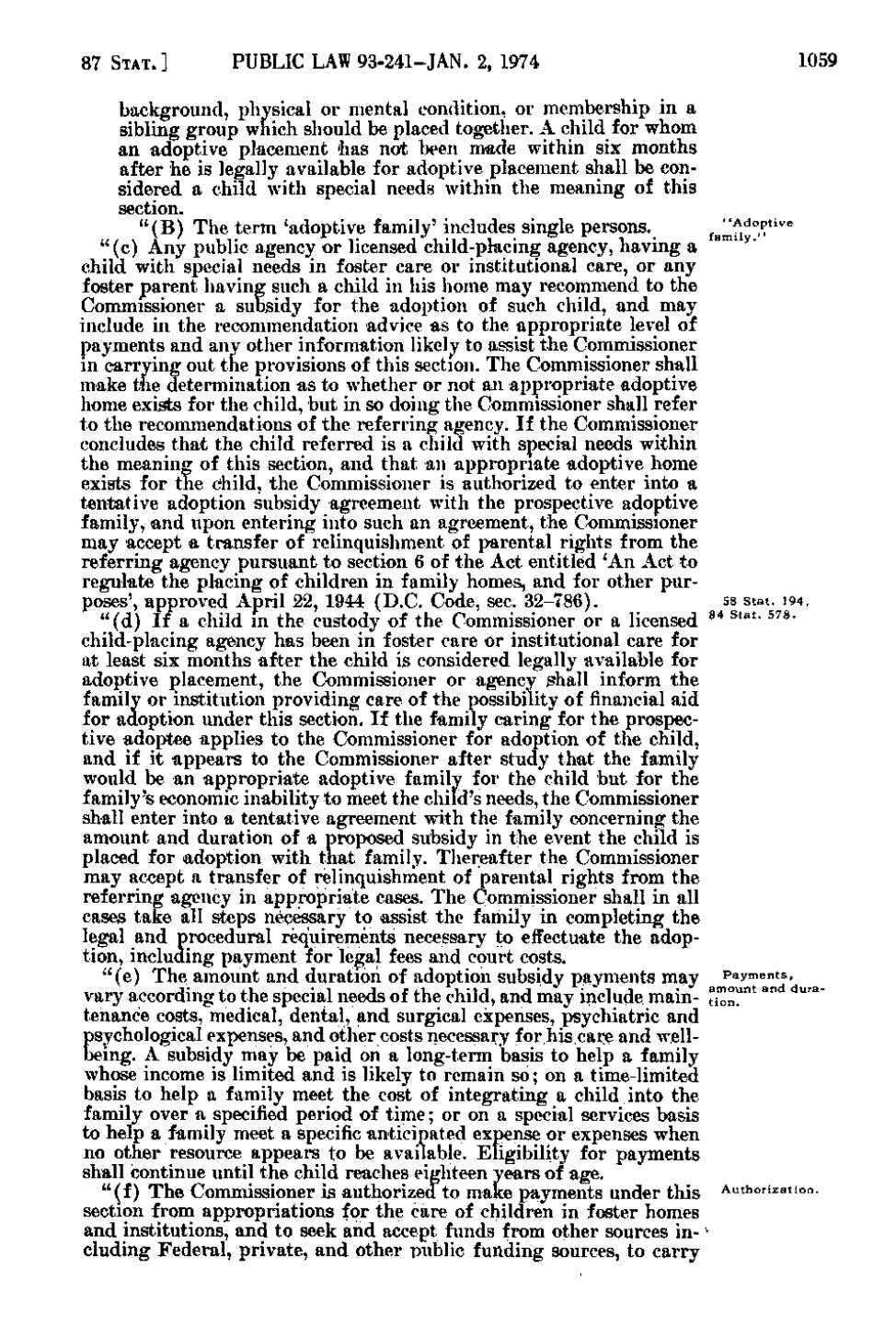87
STAT.]
PUBLIC LAW 93-241-JAN. 2, 1974
1059
background, physical or mental condition, or membership in a sibling group which should be placed together. A child for whom an adoptive placement has not been made within six months after he is legally available for adoptive placement shall be considered a child with special needs within the meaning of this section. " (B) The term 'adoptive family' includes single persons. famu°^"^^ "(c) Any public agency or licensed child-placing agency, having a child with special needs in foster care or institutional care, or any foster parent having such a child in his home may recommend to the Commissioner a subsidy for the adoption of such child, and may include in the recommendation advice as to the appropriate level of payments and any other information likely to assist the Commissioner in carrying out the provisions of this section. The Commissioner shall make the determination as to whether or not an appropriate adoptive home exists for the child, but in so doing the Commissioner shall refer to the recommendations of the referring agency. If the Commissioner concludes that the child referred is a child with special needs within the meaning of this section, and that an appropriate adoptive home exists for the child, the Commissioner is authorized to enter into a tentative adoption subsidy agreement with the prospective adoptive family, and upon entering into such an agreement, the Commissioner may accept a transfer of relinquishment of parental rights from the referring agency pursuant to section 6 of the Act entitled 'An Act to regulate the placing of children in family homes, and for other purposes', approved April 22, 1944 (D.C. Code, sec. 32-786). ss Stat. i94; " (d) If a child in the custody of the Commissioner or a licensed *•* ^*^*" ^^^' child-placing agency has been in foster care or institutional care for at least six months after the child is considered legally available for adoptive placement, the Commissioner or agency shall inform the family or institution providing care of the possibility of financial aid for adoption under this section. If the family caring for the prospective adoptee applies to the Commissioner for adoption of the child, and if it appears to the Commissioner after study that the family would be an appropriate adoptive family for the child but for the family's economic inability to meet the child's needs, the Commissioner shall enter into a tentative agreement with the family concerning the amount and duration of a proposed subsidy in the event the child is placed for adoption with that family. Thereafter the Commissioner may accept a transfer of relinquishment of parental rights from the referring agency in appropriate cases. The Commissioner shall in all cases take all steps necessary to assist the family in completing the legal and procedural requirements necessary to effectuate the adoption, including payment for legal fees and court costs. " (e) The amount and duration of adoption subsidy payments may Payments, vary according to the special needs of the child, and may include main- ^/^n""* ^"'^ '*"'^' tenance costs, medical, dental, and surgical expenses, psychiatric and psychological expenses, and other costs necessary for his care and wellbeing. A subsidy may be paid on a long-term basis to help a family whose income is limited and is likely to remain so; on a time-limited basis to help a family meet the cost of integrating a child into the family over a specified period of time; or on a special services basis to help a family meet a specific anticipated expense or expenses when no other resource appears to be available. Eligibility for payments shall continue until the child reaches eighteen years of age. " (f) The Commissioner is authorized to make payments under this Authorization. section from appropriations for the care of children in foster homes and institutions, and to seek and accept funds from other sources in- ^ eluding Federal, private, and other public funding sources, to carry
�
